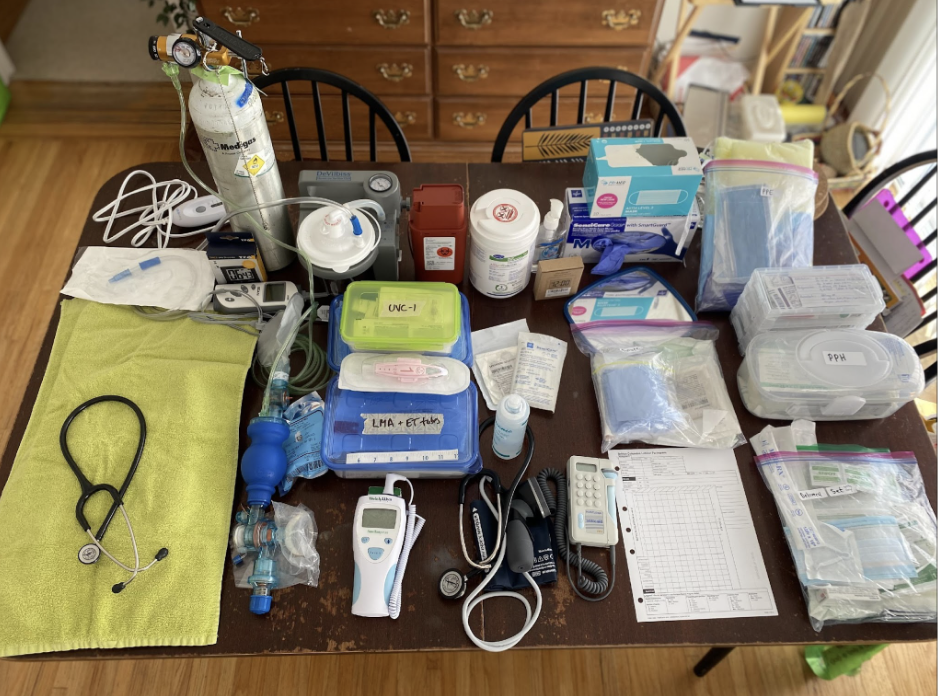Although midwifery has been regulated in British Columbia since 1998, the practice has taken place since time immemorial.
The ancient profession is essential for cultural groups and communities across the globe in maintaining the health of equity-deserving groups, ensuring the safe birth of babies and supporting early family well-being. Midwives have the unique skills and knowledge set to deliver perinatal and newborn care in some of the most diverse settings.
Lisa Sutherland, primary care lead, Midwifery, with Perinatal Services BC (PSBC) points out that midwives are key to increasing communities’ resilience in emergencies. The COVID-19 pandemic was a prime example. From 2020-2022, BC midwives showed up to support the increase the province saw in home births as many expectant parents opted to give birth outside of a hospital setting during the public health emergency. This same adaptability is frequently demonstrated by BC midwives during climate events that lead to evacuations, and major health system and infrastructure impacts.
The Canadian Association of Midwives’ recent webinar: Climate Change, Reproductive Justice and the Future of Midwifery Care
“I am inspired by BC midwives who respond to crises in their communities. Whether it is by taking on the care of pregnant and newly parenting families displaced by the wildfires in and around BC, or by strengthening partnerships within the health system to ensure families are getting the care they need – communities benefit from having midwives in times of crisis,” shares Lisa.
Through work within PHSA and with professional associations, Lisa has been a strong voice for midwives and the populations they serve in the context of climate change. In 2019, Lisa brought forward
a motion to the Canadian Association of Midwives to address the heightened impacts of climate change on the populations midwives serve and provide support for midwives in the many roles they play during climate events. She also led the development of a clinical care topic for health-care providers on
Climate Change and Perinatal and Newborn Health for PSBC’s Perinatal & Newborn Health Hub.
“In addition to the critical work that registered midwives on the front-line carry out around the province to support perinatal and newborn populations impacted by climate events, midwives in leadership roles are also well positioned to support equitable access to climate-related health promotion and prevention initiatives by ensuring the perspective of midwives are considered in strategic planning and policy development,” says Misty Wasyluk, provincial lead, Public Health and Primary Care, Perinatal Services BC.
Misty is a non-practicing midwife who recently joined PSBC. Even from previous professional roles, Misty is well aware of the great, midwife-led and -informed strategic planning work at PHSA programs and sites like PSBC and the BC Women’s Hospital, including
PSBC’s Home Birth Supplies Program.
PSBC formed the program in partnership with BC’s regional health authorities and the Government of BC’s Product Distribution Centre in 2016 to increase BC midwives’ access to home birth supplies. Expanding access offers midwives and health-care providers the necessary resources to support the safe birthing of a baby during crises, like climate events.
Perinatal Services BC's Home Birth Supplies Checklist
The Department of Midwifery at BC Women’s Hospital is also actively working to expand safe home birth access. The department’s Home Birth Committee is collaborating with midwives in Vancouver to launch a regularly scheduled home birth information session series that brings expectant families together to further explore the option of a safe home birth. The committee has also introduced a centralized home birth supplies station for nearby midwives, with frequent re-stocking made possible through PSBC’s Home Birth Supplies Program.
While home births may be the safest or only option during some climate events, they can also mitigate planetary health impacts from waste and emissions as they require less supplies and travel.
 A home birth supplies kit (source: BC Women's Hospital Department of Midwifery Hombirth Committee)
A home birth supplies kit (source: BC Women's Hospital Department of Midwifery Hombirth Committee)
More access to home births, home birth supplies and midwives means reduced planetary health impacts, and increased community resilience and preparedness in the face of climate change.
The expanding role of midwives to support our health system and the families they serve is multi-faceted. From system improvement to health promotion to direct care delivery, they play a key role in building and supporting a climate-resilient and healthy population.
